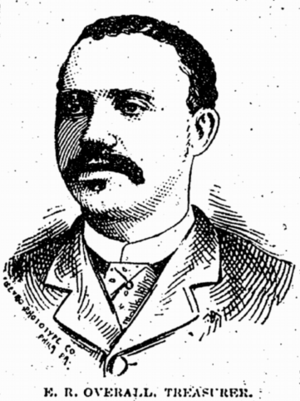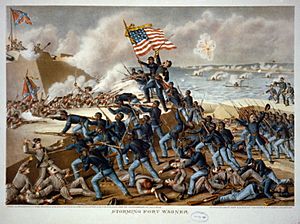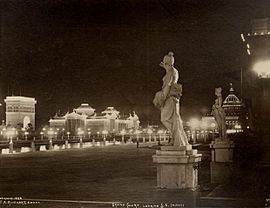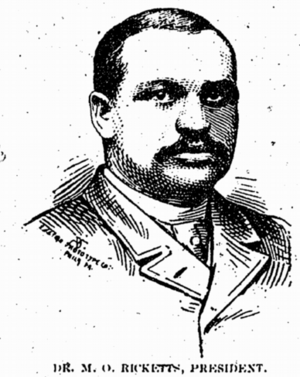Edwin R. Overall facts for kids
Quick facts for kids
Edwin R. Overall
|
|
|---|---|

Phototype from the Progress, June 21, 1890
|
|
| Born | August 25, 1835 |
| Died | July 31, 1901 (aged 65) Omaha, Nebraska, U.S.
|
| Occupation | abolitionist, civil rights activist, mail carrier, and politician |
| Political party | Republican, Populist |
| Spouse(s) | Mary L. Blackburn, Mary E. Washington |
Edwin R. Overall (born August 25, 1835 – died July 31, 1901) was an important leader who fought for the rights of African Americans. He was an abolitionist, meaning he worked to end slavery. He was also a civil rights activist, a mail carrier, and a politician.
Overall was active in Chicago and later in Omaha, Nebraska. In the 1850s and 1860s, he helped with the Underground Railroad in Chicago. This was a secret network that helped enslaved people escape to freedom. During the American Civil War, he helped recruit black soldiers to fight for the Union Army.
After the war, he moved to Omaha. There, he helped start the National Afro-American League, which worked for black rights. In 1890, he was the first black person in Nebraska to be nominated for the state legislature. Even though he didn't win, his friend Matthew Ricketts became the first African American elected to the Nebraska legislature two years later. Overall was also a leader in workers' rights in Omaha.
Contents
Life Story of Edwin Overall
Early Years and Family
Edwin Overall was born into slavery in Saint Charles County, Missouri, on August 25, 1835. His mother was enslaved, and for a while, he used the last name Williams. As a boy, he worked on a farm. Around 1855, he moved to Chicago and went to the Jones School. He even studied law for a bit in 1861 but had to stop because of money problems. He moved to Omaha in the late 1860s.
In 1859, Edwin married M. L. Blackburn. They had many children: Ida, Grace Victoria, Florence Esther, Norman Murray, Maud, Guy, and Eula. Eula became a teacher in the Omaha Public Schools. His daughters Victoria, Florence, and Ida also became teachers in Kansas City. After his first wife passed away, he married Mary E. Washington around 1887.
Becoming Edwin Overall
In 1875, Edwin's father died, and Edwin received a large inheritance. This is when he changed his last name from Williams to Overall. With this money and his own businesses, he became one of the richest people in Omaha. He bought a lot of land and was a leader in the Missouri and Nebraska Coal Mining Company.
Edwin Overall met many important people. Paul Laurence Dunbar, a famous poet, visited him. Overall also helped welcome President Ulysses S. Grant to Omaha in 1879. He worked closely with local leaders like Andrew Rosewater and Edward Rosewater on city projects.
He passed away on July 31, 1901, due to a kidney illness. He was buried at Prospect Hill Cemetery.
Edwin Overall and the Civil War

When he was 20, Edwin moved to Chicago and became a strong voice against slavery. He joined the Quinn Chapel AME Church. There, he was part of the church's Anti-Slavery association and helped with the Underground Railroad. He also cared deeply about educating black people. He was a leader in Sunday schools and a literary club for young black men.
Recruiting Black Soldiers
When the American Civil War began, Edwin pushed for black people to join the Union Army. In April 1861, he led a meeting in Chicago. They called for black troops to be allowed to fight. They also wanted to raise money for soldiers and their families.
In 1863, the governor of Massachusetts allowed black men to join the army. Overall was chosen to help recruit soldiers in the western states. He recruited for the 54th Massachusetts Infantry Regiment and the 55th Massachusetts Infantry Regiment. These were famous black regiments. He also offered to help the governor of Illinois raise black troops.
In April 1863, Overall played a big part in a meeting at Quinn's Chapel. African Americans gathered to organize a call to arms. Overall spoke about how much black people wanted to fight for the Union. He was then chosen for the committee that would recruit soldiers.
After the War: Civil Rights Work
After the Civil War, Overall continued to work for the rights of black people. In October 1866, he led the Chicago group to a meeting in Galesburg, Illinois. This meeting discussed the challenges black people faced in Illinois, like limits on education and legal rights. They wanted full political rights, especially the right to vote. Overall was on several committees, pushing for black voting rights and access to public schools.
Fighting for Rights in Omaha
In the late 1860s, Overall moved to Omaha, Nebraska. He kept fighting for civil rights there. When he arrived, Omaha schools were segregated, meaning black and white students went to separate schools. In 1868, he led the fight to end this segregation, and by 1869, the school system was no longer segregated.
In 1869, he became a mail carrier for the United States Postal Service. This made him the first black mail carrier in Nebraska. He was the only black person to hold a government job in Nebraska until the 1880s. He worked for the postal service almost until his death.
Overall also helped start literary societies in Omaha. These clubs became important places for African Americans to gather and discuss ideas. In 1882, one club celebrated John R. Lynch becoming a member of the United States House of Representatives. Overall worked with other leaders like Cyrus D. Bell and Matthew Ricketts to support black newspapers and improve black rights locally and nationally.
The Afro-American League
In 1889 and 1890, a national group called the National Afro-American League was formed to advance the rights of black people. Overall helped organize a local branch in Omaha. In January 1890, he was elected chairman of the Omaha meeting. There were some disagreements about the rules, like whether white people could join. Eventually, Overall and others attended the national meeting of the league. At the national meeting, Overall served on the Committee on Credentials. Later that year, he became the treasurer of the Nebraska chapter of the league.
Omaha's Big Exposition

In 1897 and 1898, Omaha hosted a huge event called the Trans-Mississippi Exposition. Overall helped organize a "Congress of White and Colored Americans" to be held during this event. He worked to bring a convention of the National Colored Personal Liberty League to Omaha in August 1898. Important leaders and politicians welcomed the attendees. Other groups, like the National Colored Press Association, also met in Omaha during the Expo.
Politics and Workers' Rights
In 1880, Overall was a leader in the "colored Campaign Club" in Omaha. He worked to organize black voters in Nebraska to show their power. He tried to get nominated for the state legislature but wasn't chosen by his party.
In the 1880s, he became active in groups that fought for workers' rights. He joined the Knights of Labor, a large labor organization. In 1895, he was the treasurer of the Nebraska State Federation of Labor.
In 1890, he finally received the Republican nomination for the state legislature. He also had the support of the labor party. However, he lost the election. Many believed he lost because some white Republicans did not vote for him due to his race. In 1893, he ran for a spot on the Omaha City Council as a Populist candidate, supporting workers' rights.
In 1898, Overall was elected as a statistician for the National Federation of Colored Labor of the United States. He also attended a meeting of the National Colored Soldiers and Sailors Association. This group wanted to build a monument in Washington, D.C., to honor black soldiers from the Civil War and the Spanish–American War.
 | Georgia Louise Harris Brown |
 | Julian Abele |
 | Norma Merrick Sklarek |
 | William Sidney Pittman |


